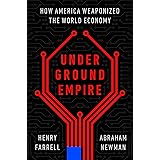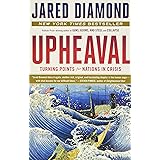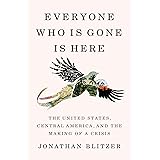Buy new:
-54% $12.89$12.89
Save with Used - Good
$8.54$8.54
Ships from: Amazon Sold by: Martistore

Download the free Kindle app and start reading Kindle books instantly on your smartphone, tablet, or computer - no Kindle device required.
Read instantly on your browser with Kindle for Web.
Using your mobile phone camera - scan the code below and download the Kindle app.

OK
 Audible sample Sample
Audible sample Sample 


War on Peace: The End of Diplomacy and the Decline of American Influence Hardcover – April 24, 2018

Explore your book, then jump right back to where you left off with Page Flip.
View high quality images that let you zoom in to take a closer look.
Enjoy features only possible in digital – start reading right away, carry your library with you, adjust the font, create shareable notes and highlights, and more.
Discover additional details about the events, people, and places in your book, with Wikipedia integration.
Purchase options and add-ons
A harrowing exploration of the collapse of American diplomacy and the abdication of global leadership, by the winner of the 2018 Pulitzer Prize in Public Service.
US foreign policy is undergoing a dire transformation, forever changing America’s place in the world. Institutions of diplomacy and development are bleeding out after deep budget cuts; the diplomats who make America’s deals and protect its citizens around the world are walking out in droves. Offices across the State Department sit empty, while abroad the military-industrial complex has assumed the work once undertaken by peacemakers. We’re becoming a nation that shoots first and asks questions later.
In an astonishing journey from the corridors of power in Washington, DC, to some of the most remote and dangerous places on earth―Afghanistan, Somalia, and North Korea among them―acclaimed investigative journalist Ronan Farrow illuminates one of the most consequential and poorly understood changes in American history. His firsthand experience as a former State Department official affords a personal look at some of the last standard bearers of traditional statecraft, including Richard Holbrooke, who made peace in Bosnia and died while trying to do so in Afghanistan.
Drawing on newly unearthed documents, and richly informed by rare interviews with warlords, whistle-blowers, and policymakers―including every living former secretary of state from Henry Kissinger to Hillary Clinton to Rex Tillerson―War on Peace makes a powerful case for an endangered profession. Diplomacy, Farrow argues, has declined after decades of political cowardice, shortsightedness, and outright malice―but it may just offer America a way out of a world at war.
- Print length432 pages
- LanguageEnglish
- PublisherW. W. Norton & Company
- Publication dateApril 24, 2018
- Dimensions9.6 x 6 x 1.5 inches
- ISBN-100393652106
- ISBN-13978-0393652109
Frequently bought together

Similar items that may deliver to you quickly
Editorial Reviews
Review
― Daniel Kurtz-Phelan, The New York Times
"Offers lively writing, astute commentary, and plenty of great stories, laced through with passion and outrage....Farrow is a natural storyteller, and his empathy and imagination breathe life even into the endless, awkward Thanksgiving dinner that constitutes diplomacy."
― Rosa Brooks, Washington Post
"Dogged research and persuasive argument....Farrow brings to his book astonishing access....[he is] an indefatigable and imaginative reporter."
― David Shribman, The Globe and Mail
"A masterpiece….The writing sparkles."
― Dan Simpson, Pittsburgh Post-Gazette
"A compelling mixture of political analysis and personal anecdote."
― Andrew Anthony, The Guardian
"Has the United States turned its back on diplomacy, and on its diplomats? And if so, at what cost? Farrow makes a good case that we have, and that the cost will be high....He captures extraordinarily well what the work of diplomacy means."
― Barbara K. Bodine, San Francisco Chronicle
"With astonishing reporting and gripping prose, Ronan Farrow tells the powerful story of the gutting of American diplomacy…War on Peace is an indispensable and fascinating revelation of what diplomats actually do for our country and why undermining them is so dangerous. Farrow is a riveting storyteller with a great eye for colorful characters. This is one of the most important books of our time."
― Walter Isaacson, author of Steve Jobs and professor of history, Tulane
"Ronan Farrow has scooped us all (again). And it is no wonder. A gifted writer with a powerful intellect and a passion for truth, Farrow has become one of this generation’s finest journalists and War on Peace a book that will be required reading for generations to come. It is perhaps the most riveting and relatable book on foreign policy and diplomacy I have ever read. I have covered these same corridors of diplomatic power, these same bloody war zones, yet on every page of War on Peace I was astonished by what I learned."
― Martha Raddatz, ABC News chief global affairs correspondent and author of The Long Road Home
"US diplomacy has failed to keep up with the times. Part insider account and part sober analysis, War on Peace traces the fall of American diplomacy and pulls no punches. Only someone as incisive and unflinching as Farrow could have written this book―and we should all be thankful that he did. A must-read."
― Ian Bremmer, editor-at-large, Time magazine, and president, Eurasia group
"It's hard to imagine there is a single important diplomat Ronan Farrow didn't speak to in the course of reporting this remarkable account of American diplomacy in decline. This is no surprise: who better than a diplomat-turned-investigative-reporter to bring this deeply reported, acutely observed, and morally righteous chronicle of a nation that has all but abandoned diplomacy in favor of high-tech, high-ticket military action at just the perilous moment when steely and patient diplomacy is needed more than ever. This scoop-laden book is essential reading for those of us who yearn for peace and American moral leadership on a fractious planet."
― Lydia Polgreen, former editorial director, New York Times Global, and editor-in-chief, HuffPost
About the Author
Product details
- Publisher : W. W. Norton & Company; First Edition (April 24, 2018)
- Language : English
- Hardcover : 432 pages
- ISBN-10 : 0393652106
- ISBN-13 : 978-0393652109
- Item Weight : 1.54 pounds
- Dimensions : 9.6 x 6 x 1.5 inches
- Best Sellers Rank: #557,609 in Books (See Top 100 in Books)
- #710 in United States National Government
- #736 in United States Executive Government
- #2,080 in History & Theory of Politics
- Customer Reviews:
About the author

Ronan Farrow is an investigative journalist who writes for The New Yorker and makes documentaries for HBO. He has been an anchor and reporter at MSNBC and NBC News, and his writing has appeared in publications including The Wall Street Journal and The Washington Post. A series of stories he wrote in 2017 exposed the first allegations of sexual assault against the movie producer Harvey Weinstein. Prior to his work as a journalist, he served as a State Department official in Afghanistan and Pakistan and reported to the Secretary of State as a senior official focused on youth uprisings. He is a Yale Law School-educated attorney and studied at Oxford as a Rhodes Scholar. He is a winner of the Pulitzer Prize for Public Service, the George Polk Award, and the National Magazine Award, among other commendations, and has been named one of Time magazine’s 100 Most Influential People (and also one of People’s Sexiest Men Alive, which doesn’t have anything to do with his career, but he still brings it up a lot).
Customer reviews
Customer Reviews, including Product Star Ratings help customers to learn more about the product and decide whether it is the right product for them.
To calculate the overall star rating and percentage breakdown by star, we don’t use a simple average. Instead, our system considers things like how recent a review is and if the reviewer bought the item on Amazon. It also analyzed reviews to verify trustworthiness.
Learn more how customers reviews work on AmazonReviews with images
-
Top reviews
Top reviews from the United States
There was a problem filtering reviews right now. Please try again later.
Combining careful research and analysis with first person interviews, Farrow illustrates the direction the United States government has taken over the past few decades in valuing militarism, devaluing diplomacy, and the disappointing and dire consequences for having done so.
His accounts of where diplomacy has worked are realistic, not overly rosy. He portrays diplomacy as a messy, difficult, process, carried out by flawed human beings, and fraught with compromises that often do not leave the parties involved fully satisfied. And yet, the alternative--force--is clearly worse and, in the long run, does not seem to work to make either the US or any other place in the world safer. In fact, the opposite is mostly true.
From reading this book, I got the impression that diplomats are often forced into positions of having to tolerate and even condone a certain amount of militarism. Farrow can't help but wonder if Democrats and Republicans valued diplomatic efforts more than these Pyrrhic proxy wars (and if the State Department and USAID were fully funded so as to be staffed with experienced and dedicated career diplomats, with a deep knowledge of the part of the world they were addressing, combined with their having sophisticated negotiating skills), if conditions here and abroad would not be so much better. Instead, over the years, and especially now, the State Department and USAID are being gutted of skilled, career professionals in favor of militarism and "might makes right."
According to Farrow, this gutting of State, while seeming to reach its apex with Trump, was moving in that direction under other heads of state, such as Clinton, Bush and Obama. Farrow implies that Obama somewhat redeemed himself during his second four years with the Paris Accord, Iran Deal, and rapprochement with Cuba, all of which might be reversed under Trump. Farrow quotes Secretary John Kerry, who worked tirelessly on the Iran deal, as saying about Trump's threat to kill it, "If that's the art of the deal, you can see why this guy went belly up seven times."
A quote by Cicero in the Epilogue sums up this thoughtful read: There are two types of military dispute, the one settled by negotiation and the other by force. Since the first is characteristic of human beings and the second of beasts, we must have recourse to the second only if we cannot exploit the first.
Farrow's tone is measured but left me wishing that my country could move away from the direction of beasts.
The story begins with an important diplomat Richard Holbrooke. This story describes the disintegration of his last mission concerning Pakistan and Afghanistan, and provides a window into “what was lost when we turned away from a profession that once saved us.” This was a long time coming as the Pentagon and CIA often bypassed the civilian foreign policy system and did business with various country’s military and intelligence leaders directly. The ensuing chapters provide an interesting and intriguing narrative of what transpired in Pakistan and Afghanistan.
In part three of the book, Farrow discusses diplomacy, or lack thereof, in Syria (2016), Afghanistan (2002), Horn of Africa (2006), Egypt (2013), and Colombia (2006). This lessoning of dependence on diplomacy was put on steroids since the 2016 election. For example, in Iraq and Syria more decisions on troop deployment were given to the military. In Yemen and Somalia, field commanders could engage in raids without White House approval. In Afghanistan, Trump granted secretary Mattis sweeping authority to set troop levels. “Diplomats were no longer losing the argument on Afghanistan: they weren’t in it.” In addition, the White House ended the practice of “detailing” State Department officers to the National Security Council, meaning fewer diplomatic voices in the policy process. In many cases, we see military and intelligence solutions win out, and we see the U.S. actively sabotage opportunities for diplomacy, sometimes resulting in an actual increase in terrorist groups and terrorist activity. For example, the CIA’s relationship with the warlords of Somalia actually destabilized the region and enflamed Islamist sentiment. We see the rise of al-Shabaab from a fringe element with limited influence to one with ambitions beyond Somalia’s borders. Its bloody message would resonate with recruits around the world.
In the Middle East, “American administrations had chosen to stand shoulder-to-shoulder with the Middle East’s autocratic strongmen for decades.” When those regimes crumbled and the alliances became a liability, the U.S. was slow to adapt. “Military-to-military deals had eclipsed diplomacy for so long, we barely knew how to do anything else.” In Afghanistan, we see warlords ruling with the imprimatur of a government backed by the U.S. In Columbia, we see paramilitary death squads gain support of the United States. It is a slippery slope we have been following, now only compounded by the current Trump administration.
Top reviews from other countries
It gives a good glimpse on how it all unfolded to where it is now. Might write another review once I am done and digested it completely.
本書はトランプ批判が目的ではない。
米国務省の弱体化と米国政府の軍主導の外交は、今に始まった話ではなく、数十年前から始まっている。トランプ政権になって、その傾向が加速したのは事実だが。
本書は、このような傾向について、Ronan Farrow氏自身の経験、過去の国務長官たちや国務省に在籍した外交スペシャリストたちへのインタビューを通して、米国務省で何が起きているのかを描いている。
米国の外交がどこに向かっているのかを知る上で、その実情がよく分かる作品である。
なお、後半の1/3はフットノートやインデックスなので、実際のページ数は2/3程度。
Awesome book
Good quality print and paper
Reviewed in India on June 28, 2020
Awesome book
Good quality print and paper





















